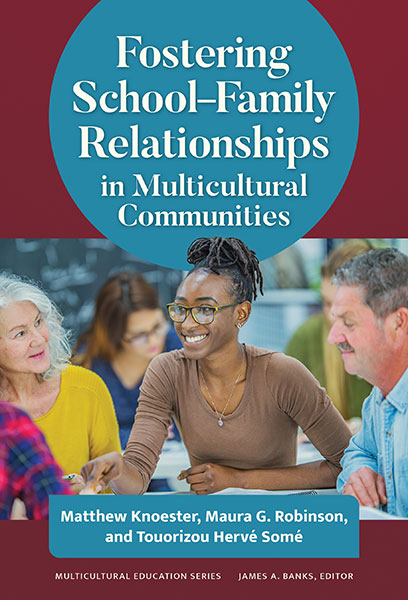Professors: Request an Exam Copy
Print copies available for US orders only. For orders outside the US, see our international distributors.
Matthew Knoester, Maura G. Robinson, Touorizou Hervé Somé
Publication Date: September 26, 2025
Pages: 168
Series: Multicultural Education Series

This practitioner-friendly resource will help parents and educators with different values and viewpoints to better communicate, understand, and collaborate for the benefit of all children (K–12).
Drawing from personal stories and current research, this book suggests ways in which families and schools can work together to optimize the academic, social, and emotional development of all students, with a focus on diverse students and families.
Utilizing their unique backgrounds as professional educators, scholars, parents, and immigrants, the authors provide vivid descriptions of successful family–school collaborations, powerful culturally relevant educational experiences, effective communication models, and strategies parents can use to become stronger advocates for public schools in their communities. Discussion questions at the end of each chapter are designed to improve communication so parents can better understand the work of schools and, in turn, educators can learn from families.
Book Features:
Matthew Knoester is a professor and chair of the Educational Studies Department at Ripon College. Maura G. Robinson is a diversity, equity, inclusion, and belonging (DEIB) consultant and coach to school districts and organizations. Touorizou Hervé Somé is an associate professor in the Educational Studies Department at Ripon College.
"This book’s insightful approach to bridging diverse cultural perspectives within educational settings truly resonates with my professional experiences, and I believe its research, practical strategies, and thoughtful analysis will significantly contribute to advancing dialogue and practice in school–family partnerships. I look forward to supporting this important work and am excited to see its impact on educators and community leaders."
—Patricia A. Edwards, University Distinguished Professor, Michigan State University, College of Education
“If we hope to cultivate meaningful, lasting, trusting family–school relationships, we must reimagine what those relationships can and ought to be and then adjust everything we’re doing; the old five easy strategies never, ever work. The authors model something more transformative, stepping us through that reimagining process, contextualizing valuable practical strategies in even more valuable expansions of understanding.”
—Paul C. Gorski is the founder of the Equity Literacy Institute, and coauthor with Katy Swalwell of Fix Injustice, Not Kids and Other Principles for Transformative Equity Leadership
“Fostering School–Family Relationships in Multicultural Communities invites parents and educators to ask the questions that often go unasked about children and schools. It challenges readers to center on what really matters for children, suggesting that if we aspire to raise children who care about others and their world, we must revisit current school practices and provide opportunities for children and youth to question, explore their passions, and wrestle with new ideas. This is a book to be not only read, but discussed widely among educators, parents, and anyone else who cares about children, youth, and schools.”
—Catherine Compton-Lilly, John C. Hungerpiller Professor, University of South Carolina
“This book is an important reminder of how structural and systemic forces are necessary to build and cultivate family–school partnerships and connections. More than a set of recommendations to build individual relationships across difference, this book shows us what can happen when we, collectively and unapologetically, place students front and center in the work of education.”
—H. Richard Milner IV, author, The Race Card, Cornelius Vanderbilt Professor of Education, Vanderbilt University
Series Foreword James A. Banks xiii
Acknowledgments xix
Introduction 1
Transitioning From Nesting Instincts to the Socialization of Schooling 2
Common Questions That Arise for Parents 4
Many Purposes for Schools 6
Parents and Teachers 7
About This Book 10
About the Authors 11
A Safe Place for Inquiry 12
Discussion Questions 13
1. Education for Democracy 15
Educational Needs of a Democracy 17
Deciding on the Curriculum 19
Educational Governance 21
Book Bans and Other Violations of the Principle of Non-Repression 23
Unequal School Budgets 24
Conclusion 25
Discussion Questions 26
2. Integration and Intercultural Competence 29
Demographics and Segregation 29
Benefits of Integrated Schooling 31
Interrupting Racism 37
Conclusion 39
Discussion Questions 39
3. Education and Culture 41
Coming to the United States 41
Underestimation of Parental Knowledge 44
When Parents May Need to Speak Up on Behalf of Their Children 45
What Can Teachers and Schools Learn From Parents and Families? 48
Culturally Responsive Teaching 50
The Value of Academic Language in Schools 51
Culture and Economic Inequality 53
Conclusion 57
Discussion Questions 58
4. Improving Communication Between Families and Schools 59
One-Way Communication: Newsletters 60
One-Way Communication: Grades and Report Cards 65
One-Way Communication: Standardized Test Scores 67
Another Cautionary Note About Written Communications Sent Home to Families 69
Two-Way Communication: Parent–Teacher Conferences 71
Two-Way Communication: Individualized Education Program (IEPs) and 504 Plans 73
Two-Way Communication: Family Nights 75
Two-Way Communication: Book Study Discussions 76
Conclusion 78
Discussion Questions 79
5. The Most Challenging Aspects of Building Trust 81
Homework 83
Discipline 85
The Challenge of Sending Mixed Messages to Parents 89
Unequal Voice for Parents Within Schools 91
Confronting Race and Racism in Schools 92
Additional Concerns About Trust in Schools 97
Conclusion 99
Discussion Questions 100
6. Enhanced Parental Involvement in Schools 101
It May Take a Village, but Parents’ First Priority Is Their Own Family 102
Volunteering in the School 103
Advocacy at the City Level 105
Organizing in Buffalo, New York 107
Organizing in Southern Indiana 111
Suggestions for Organizing 113
Conclusion 115
Discussion Questions 116
7. Conclusion 119
Education and Democracy 121
Summary of the Book 124
Conclusion 128
Discussion Questions 129
Recommended Reading for Future Book Studies 131
References 133
Index 141
About the Authors 147
Professors: Request an Exam Copy
Print copies available for US orders only. For orders outside the US, see our international distributors.